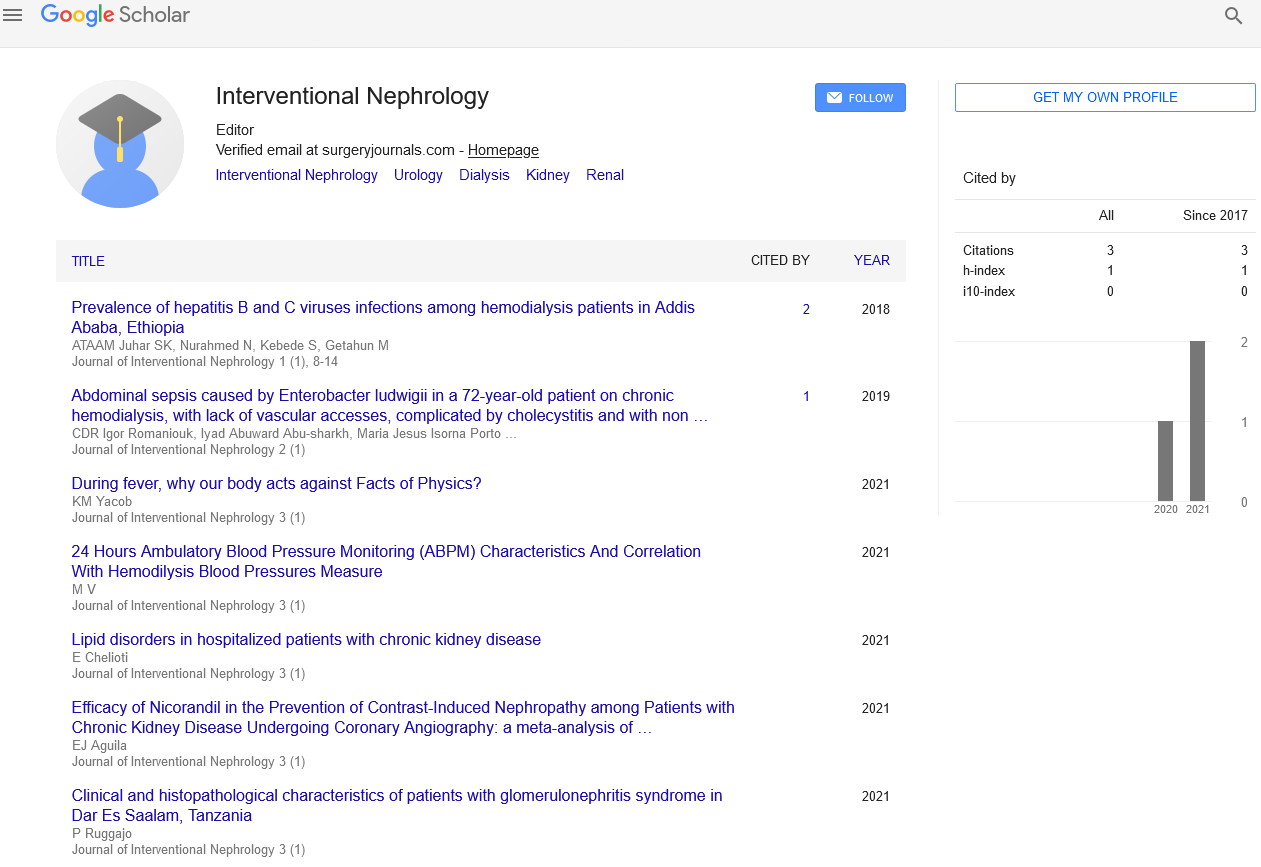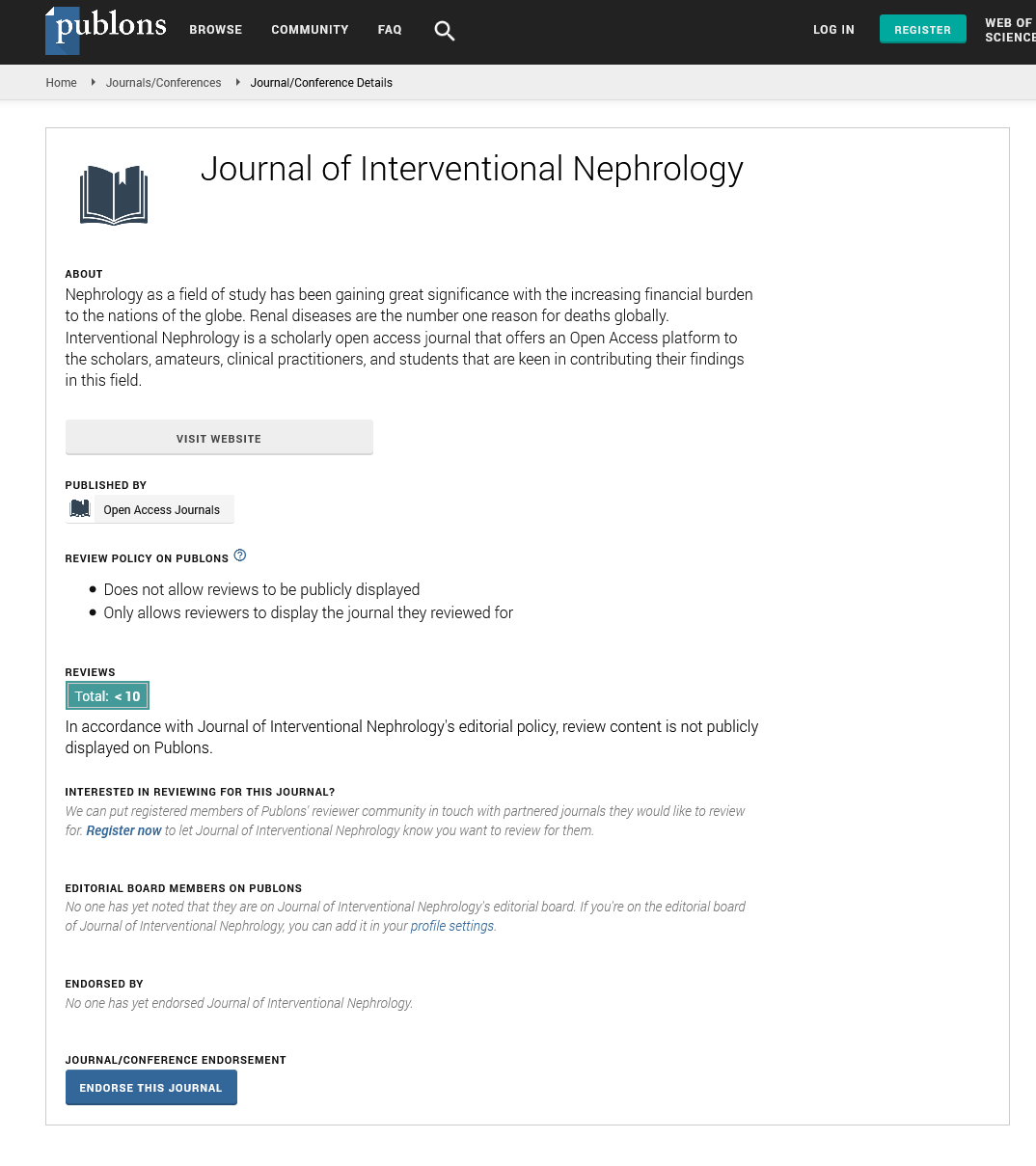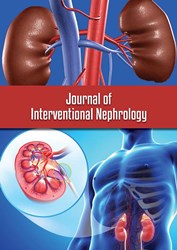Perspective - Journal of Interventional Nephrology (2024) Volume 7, Issue 1
Chronic Kidney Diseases: Navigating the Complex Landscape of Renal Health
- Corresponding Author:
- Amit Marvin
Department of Nephrology, Cornell University, Belgium
E-mail: Amitmarvin0012@gmail.com
Received: 23-Jan-2024, Manuscript No. OAIN-24-125669; Editor assigned: 25-Jan-2024, PreQC No. OAIN-24-125669 (PQ); Reviewed: 08-Feb-2024, QC No. OAIN-24-125669; Revised: 15-Feb-2024, Manuscript No. OAIN-24-125669 (R); Published: 23-Feb-2024, DOI: 10.47532/oain.2024.7(1).215-217
Abstract
Chronic Kidney Diseases (CKD) stand as a significant global health challenge, affecting millions of individuals and presenting a complex interplay of medical, social, and economic dimensions. This comprehensive article delves into the multifaceted aspects of CKD, exploring its etiology, risk factors, clinical manifestations, diagnostic approaches, treatment modalities, and the imperative need for global awareness and preventive strategies.
Keywords
Blood pressure • Electrolytes • Obesity • Diabetes mellitus • Hypertension
Introduction
Understanding CKD
Chronic nature: The surgical removal of one or both kidneys.
Global prevalence: Nephrectomy serves both curative and symptom-relieving purposes.
The role of kidneys
Renal function: Filtering blood, removing waste, and regulating fluid balance.
Critical metabolic functions: Controlling blood pressure, electrolytes, and red blood cell production.
Stages of CKD
Graded severity: CKD is categorized into stages based on the estimated Glomerular Filtration Rate (eGFR).
Clinical progression: Advancing from early stages with subtle symptoms to advanced stages with significant renal impairment.
Etiology and risk factors
Common causes of CKD: 1) Diabetes mellitus: Prolonged uncontrolled blood sugar damages renal blood vessels. 2) Hypertension: Elevated blood pressure strains kidney arteries and nephrons. 3) Glomerulonephritis: Inflammation affecting the kidney’s filtering units. 4) Polycystic kidney disease: Genetic disorder leading to cyst formation in the kidneys.
Lifestyle and environmental risk factors
Obesity: Excess weight contributes to diabetes and hypertension.
Smoking: Impairs blood flow to the kidneys and accelerates renal damage.
Poor diet: High salt and protein intake can exacerbate kidney dysfunction.
Socioeconomic determinants
Access to healthcare: Disparities in CKD detection and management based on economic factors.
Educational disparities: Lack of awareness and preventive knowledge in certain communities.
Clinical manifestations of CKD
Early stages: Often silent: 1) Asymptomatic Presentation: CKD may progress without noticeable symptoms. 2) Laboratory detection: Abnormalities in blood and urine tests serve as early indicators.
Advanced stages: Recognizable symptoms
Fatigue and weakness: Resulting from anemia and buildup of waste products.
Edema: Fluid retention leading to swelling in extremities.
Changes in urination: Frequency, color changes, and foamy urine.
Complications of CKD
Cardiovascular complications: Increased risk of heart disease and stroke.
Bone and mineral disorders: Imbalances in calcium and phosphorus affecting bone health.
Anemia: Reduced production of red blood cells by the kidneys.
Discussion
Diagnostic approaches and screening
1) Laboratory tests: eGFR measurement: Calculating the glomerular filtration rate as an indicator of kidney function. 2) Urinalysis: Assessing for proteinuria, hematuria, and other abnormalities. 3) Blood tests: Monitoring levels of creatinine, electrolytes, and other markers.
Imaging studies
Ultrasound: Visualizing kidney size, structure, and abnormalities.
CT scan and MRI: Providing detailed images for a comprehensive assessment.
Renal biopsy: Invasive procedure to examine kidney tissue in certain cases.
Importance of early detection
Preventive health check-ups: Routine screenings for individuals with risk factors.
Public health campaigns: Raising awareness about the importance of kidney health.
Management and treatment modalities
Lifestyle modifications: 1) Dietary changes: Restricting salt, managing protein intake, and staying hydrated. 2) Weight management: Addressing obesity to alleviate strain on the kidneys. 3) Smoking cessation: Halting tobacco use to improve renal outcomes.
Medications for CKD management
Blood pressure control: ACE inhibitors and Angiotensin II Receptor Blockers (ARBs) to manage hypertension.
Erythropoiesis-stimulating agents: Addressing anemia in CKD patients.
Phosphate binders: Managing mineral imbalances in advanced stages.
Renal replacement therapies
Dialysis: Hemodialysis and peritoneal dialysis to filter waste from the blood.
Kidney transplantation: Surgical replacement of a damaged kidney with a healthy donor kidney.
Challenges in CKD care and global perspectives
Economic impact: 1) Healthcare costs: Substantial financial burdens on individuals and healthcare systems. 2) Workforce productivity: CKD-related complications affecting work capacity and employment.
Access to treatment
Global disparities: Limited access to dialysis and transplantation in certain regions.
Preventive strategies: Focusing on early detection and management to reduce the need for advanced interventions.
Public awareness and education
Community initiatives: Promoting kidney health through educational programs.
Patient empowerment: Encouraging individuals to take an active role in managing their kidney health.
Research and innovations in CKD care
Precision medicine in CKD: 1) Genomic studies: Identifying genetic factors influencing CKD susceptibility and progression. 2) Personalized treatment plans: Tailoring interventions based on individual patient profiles.
Technological advancements
Remote monitoring: Telehealth solutions for continuous patient monitoring.
Artificial intelligence: Predictive analytics for early detection of CKD complications.
Collaborative research efforts
International CKD registries: Aggregating data for a comprehensive understanding of global CKD patterns.
Clinical trials: Investigating novel therapies and preventive strategies.
Patient-centric care and quality of life
Supportive care: 1) Multidisciplinary teams: Collaborative efforts among nephrologists, dietitians, social workers, and mental health professionals. 2) Palliative care: Addressing symptom management, psychosocial support, and end-of-life considerations.
Patient education and advocacy
Community outreach: Empowering individuals through educational programs.
Advocacy organizations: Supporting CKD research, awareness, and policy initiatives.
Mental health considerations
Psychosocial impact: Addressing the emotional toll of CKD and its treatment.
Counseling services: Integrating mental health support into CKD care.
Ethical considerations and future directions
Shared decision-making: 1) Informed consent: Ensuring patients actively participate in their treatment decisions. 2) Advance care planning: Discussing end-of-life preferences and treatment goals.
Organ transplantation ethics
Living donor considerations: Safeguarding the well-being of living kidney donors.
Equitable allocation: Ensuring fair distribution of deceased donor organs.
Research ethics in CKD
Inclusive clinical trials: Ensuring diverse participant representation.
Transparent reporting: Open communication of study findings and potential conflicts of interest.
Conclusion
Nephrectomy, once a formidable surgical intervention, has evolved with advancements in technology, surgical techniques, and personalized medicine. From the traditional open approach to the precision of robotic assistance, nephrectomy continues to play a crucial role in addressing a spectrum of renal conditions. As the field of urology advances, the ethical dimensions of informed decision-making, organ donation, and ongoing care take center stage. Nephrectomy, with its intricacies and implications, stands as a testament to the collaborative efforts of surgeons, researchers, and patients in navigating the ever-evolving landscape of urological care. In this journey, the commitment to preserving not just organs but also the quality of life and ethical principles remains paramount, shaping a future where nephrectomy contributes to enhanced well-being and patient-centered care.


